Charles E W Bean, Diaries, AWM38 3DRL 606/1/1 - October - December 1914 - Part 14
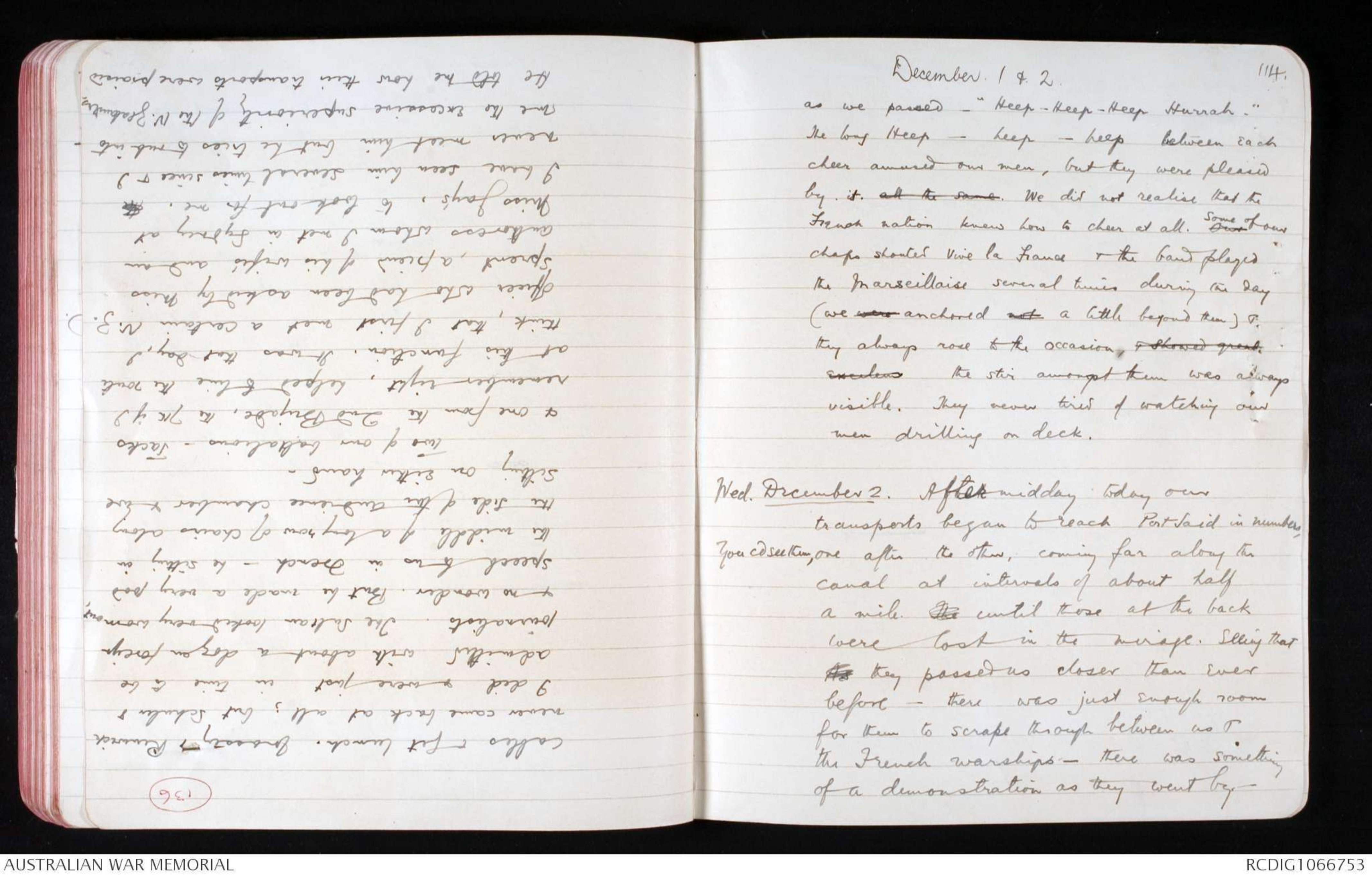
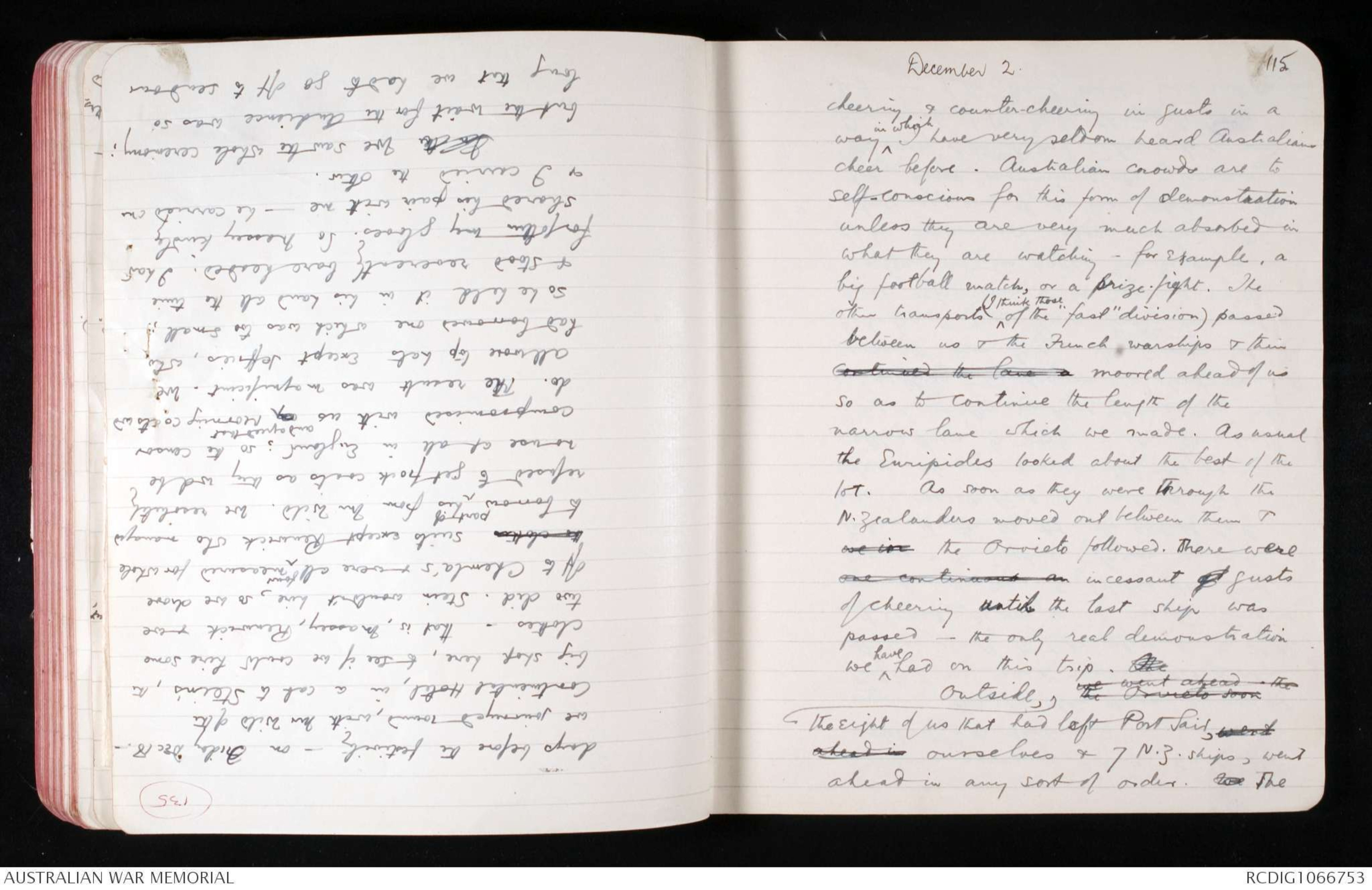
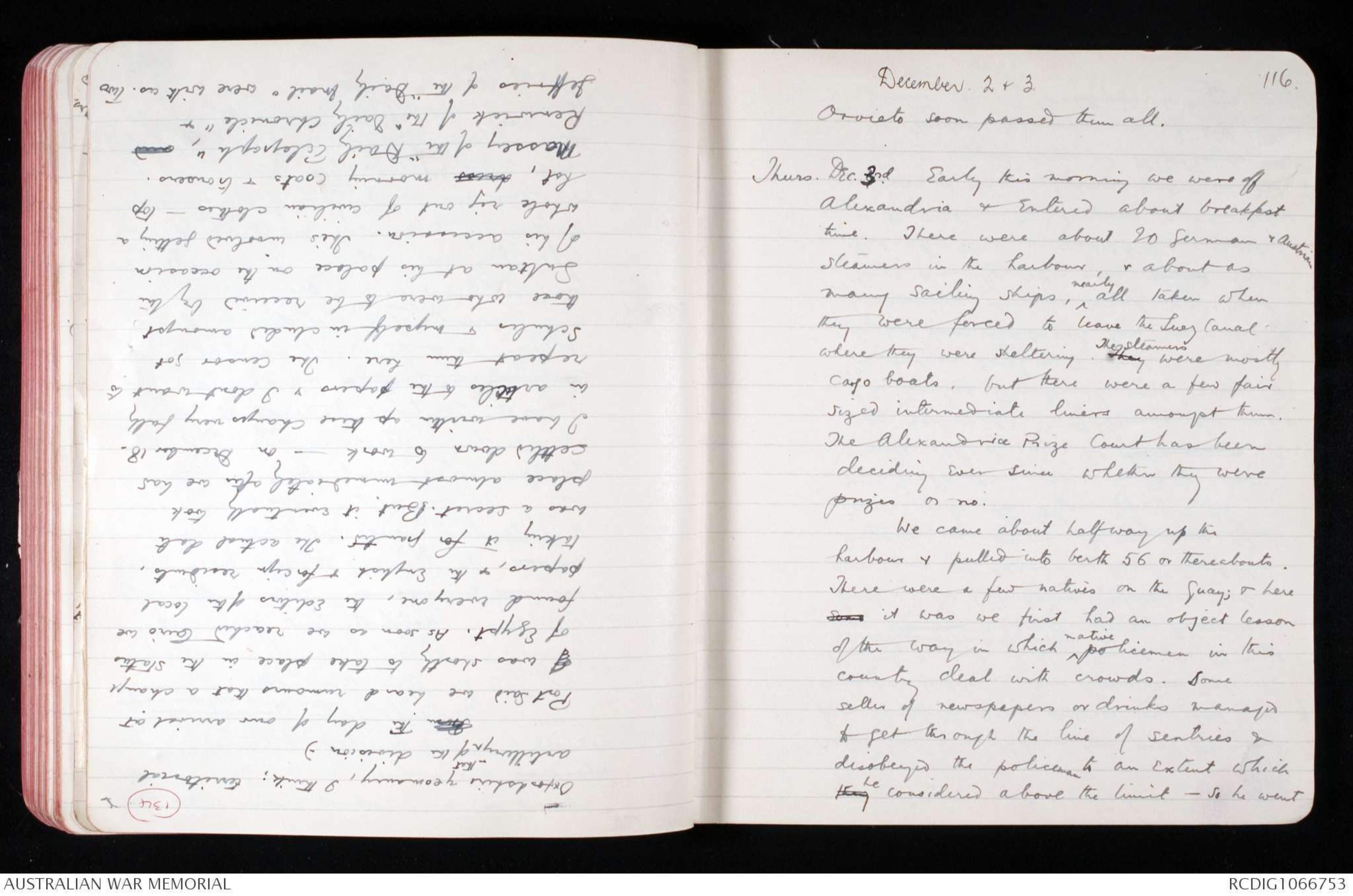
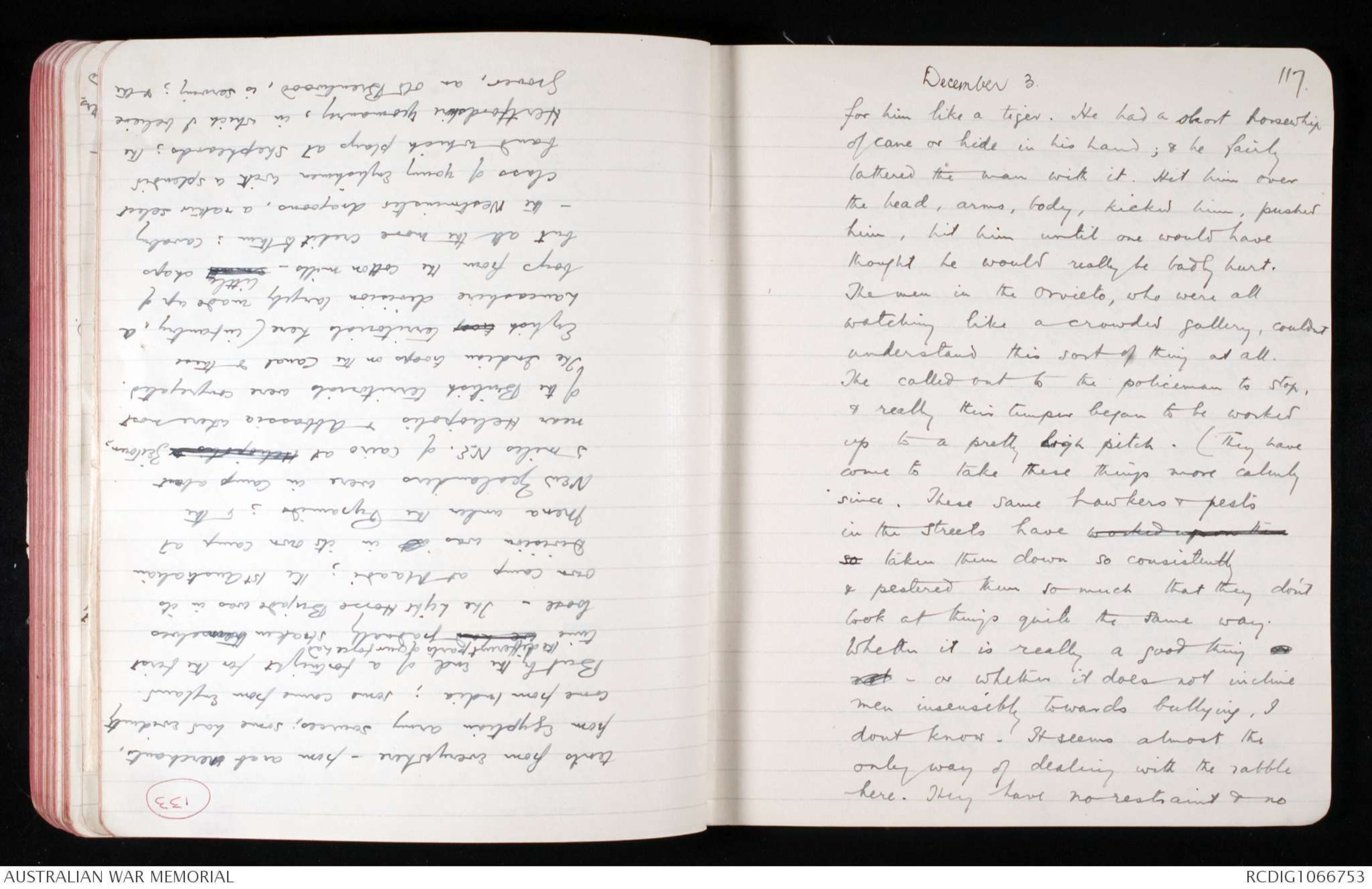
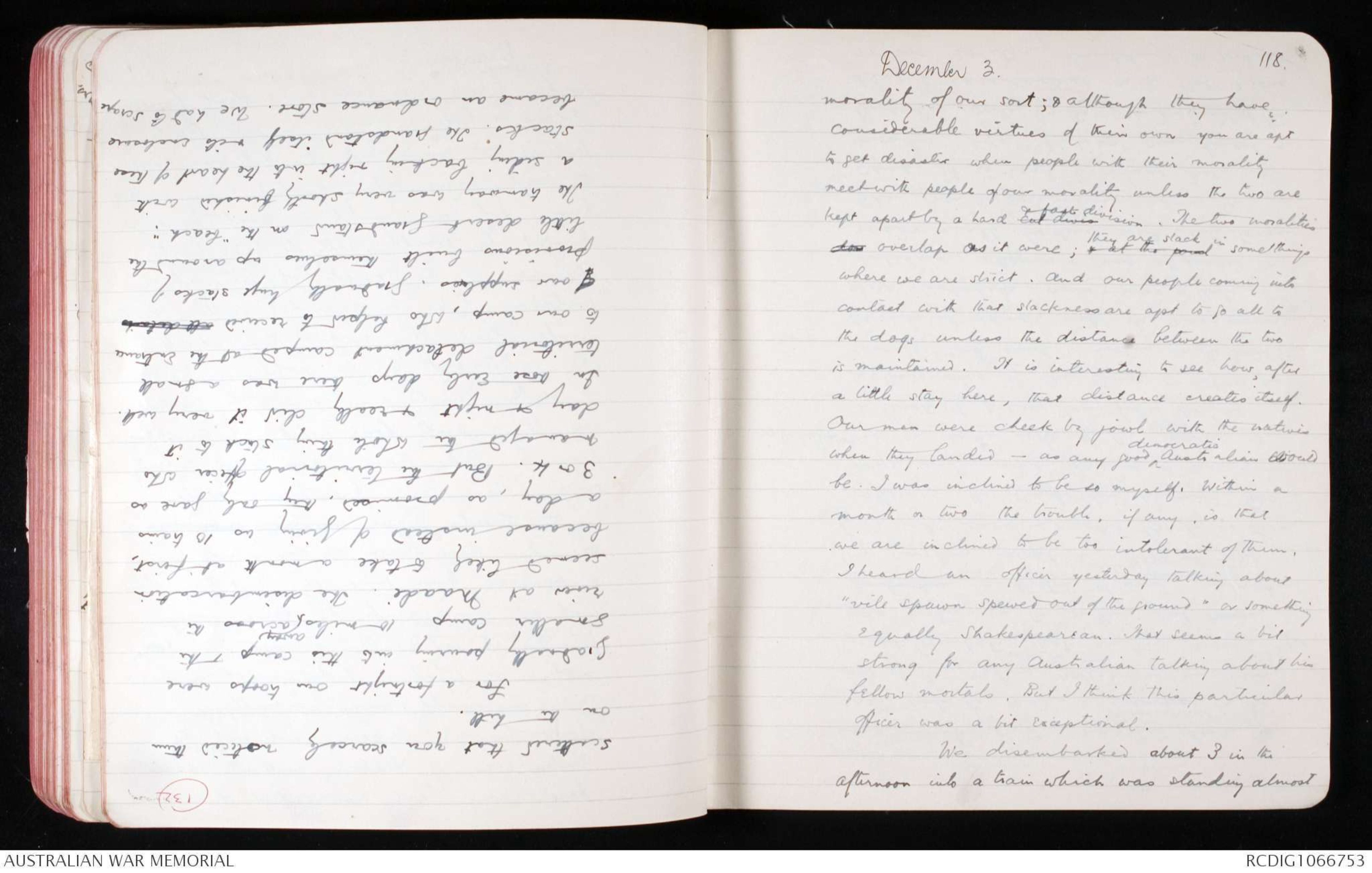
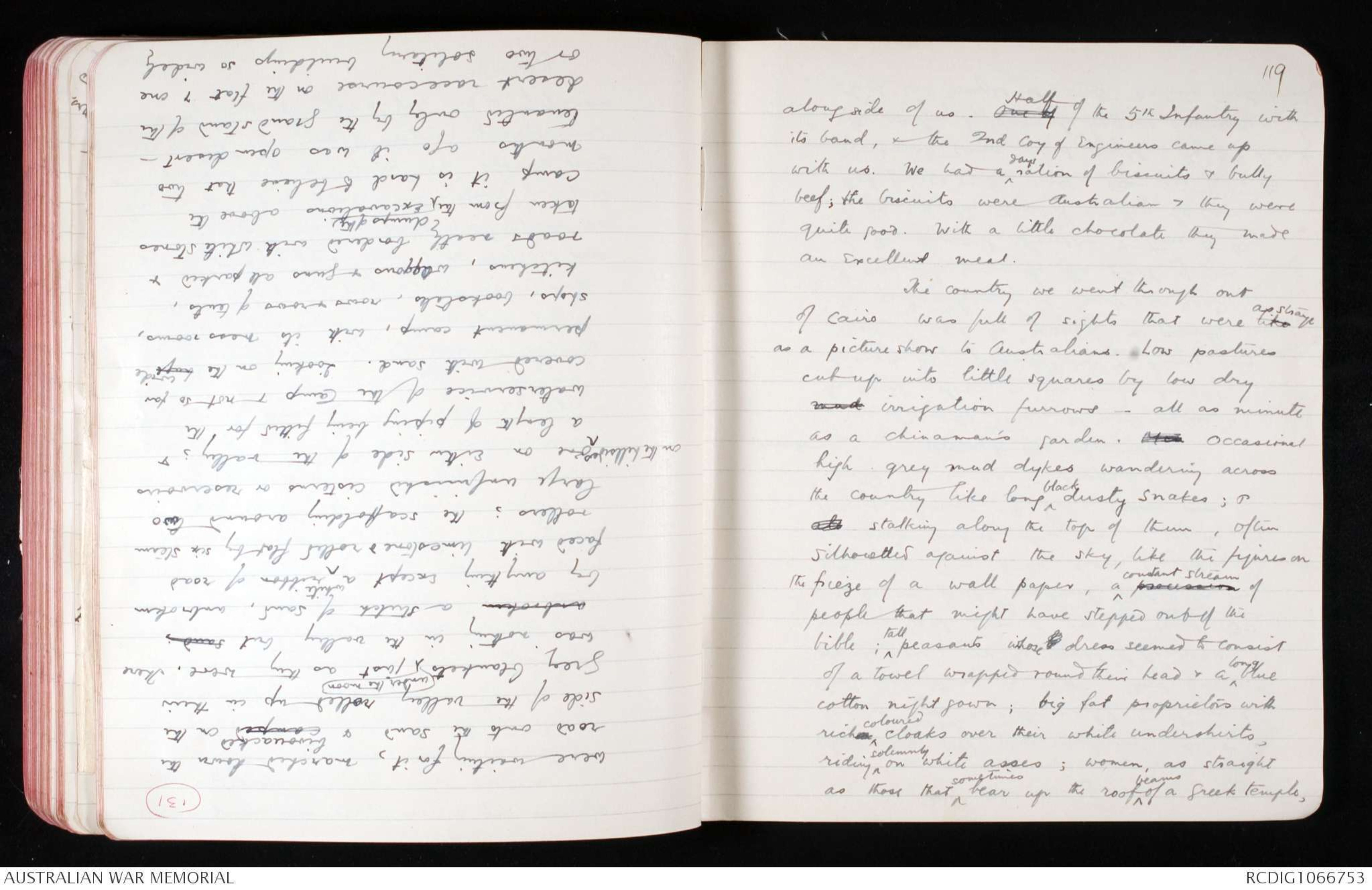
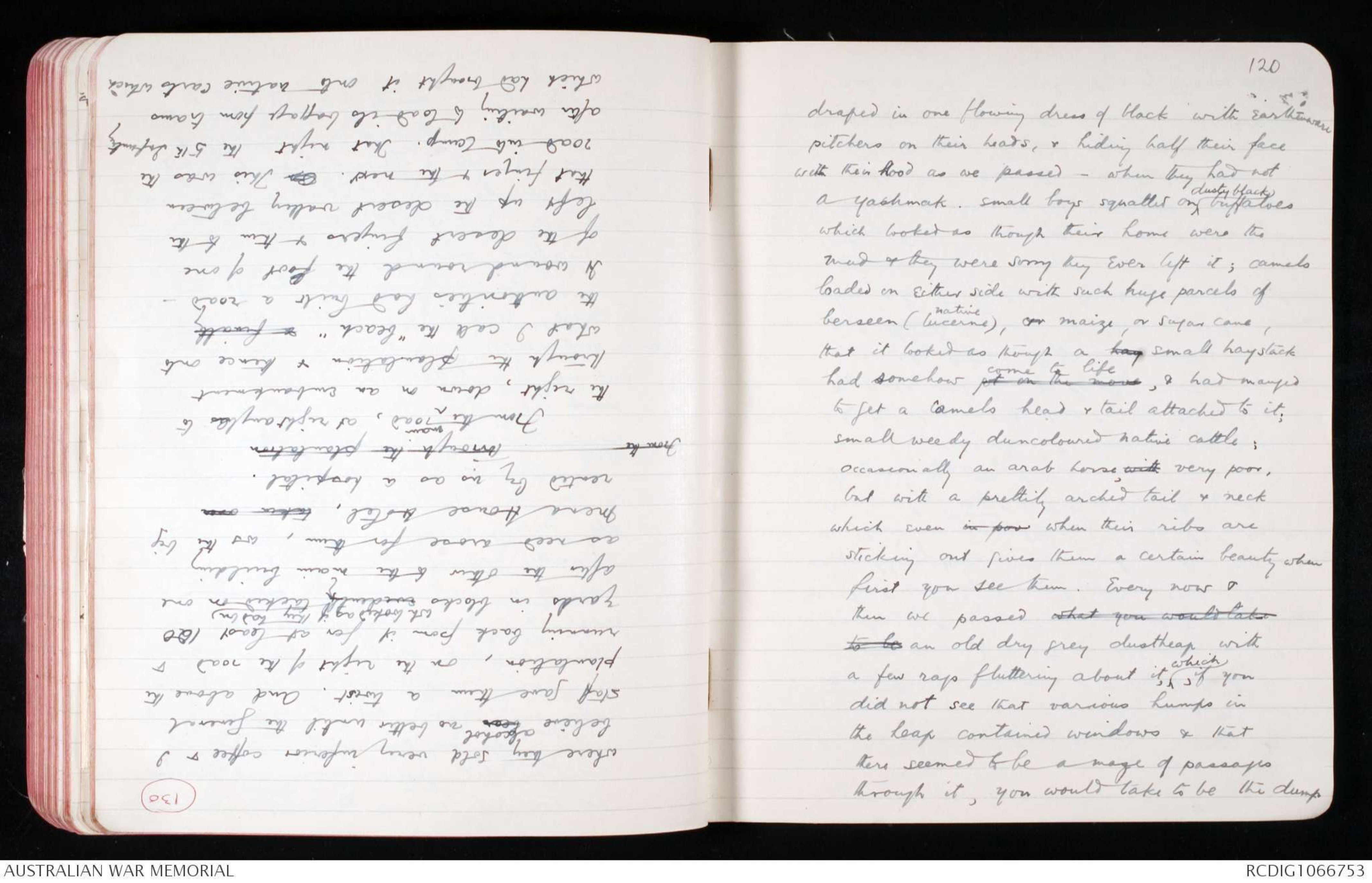
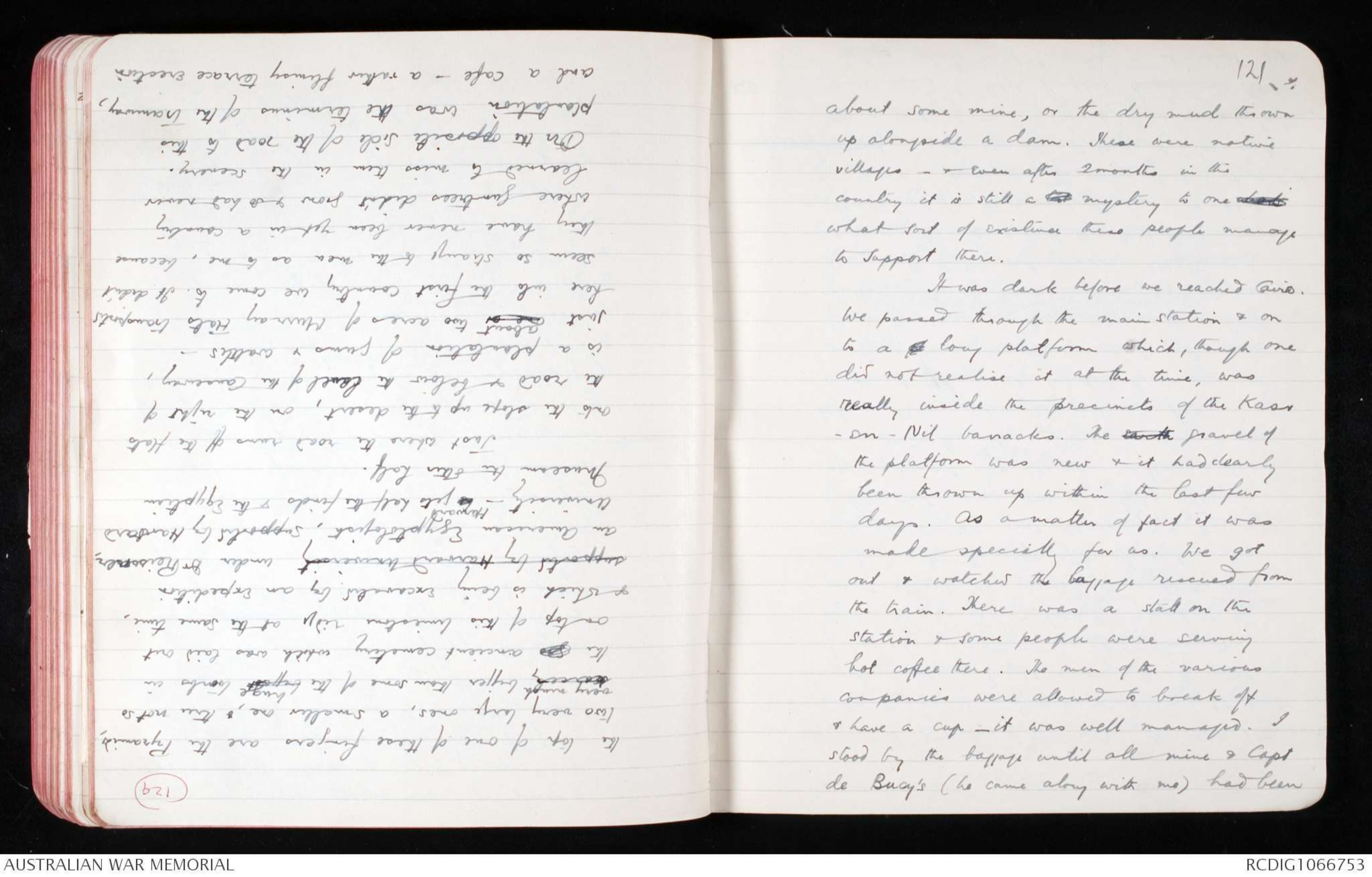
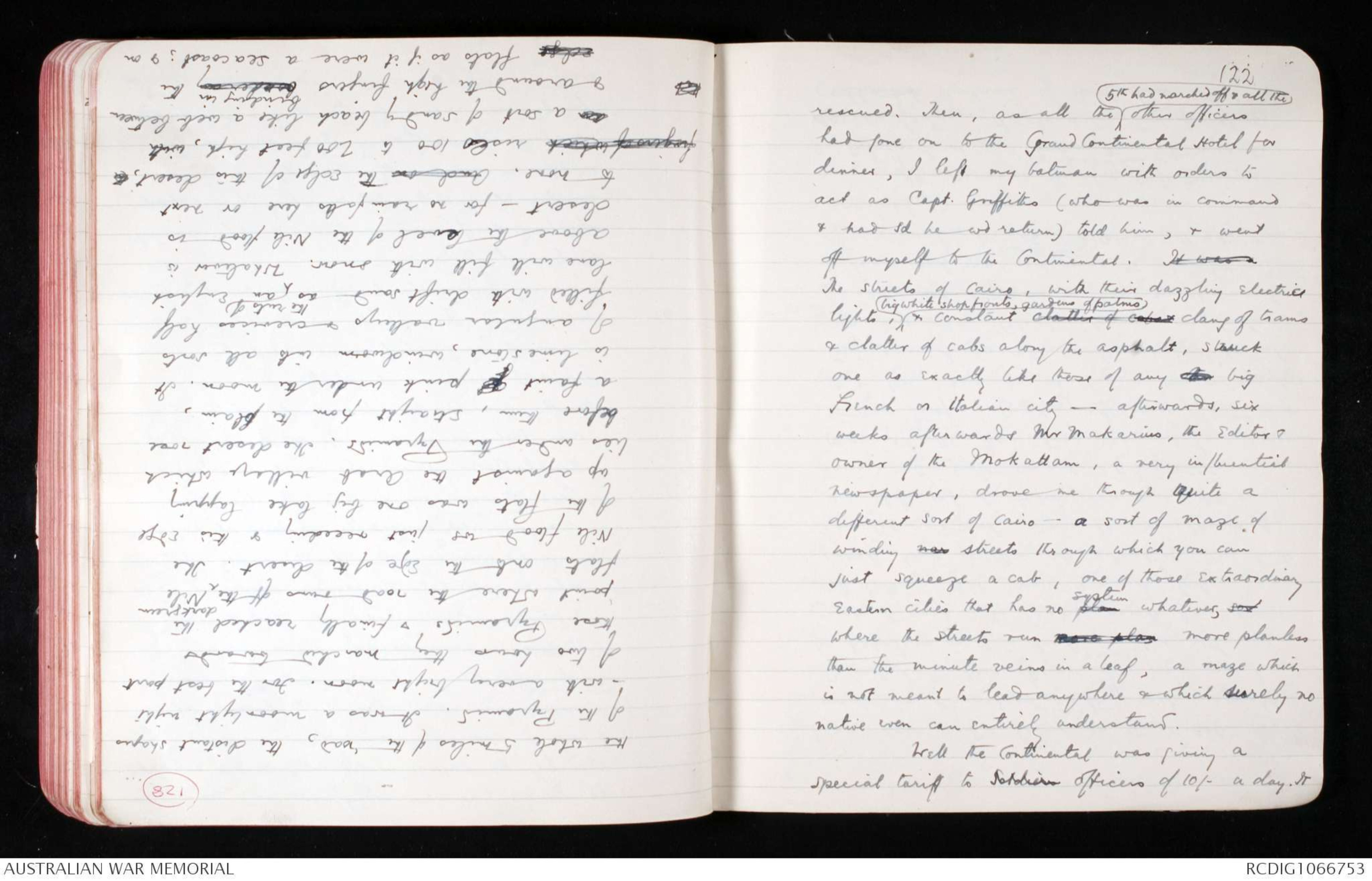
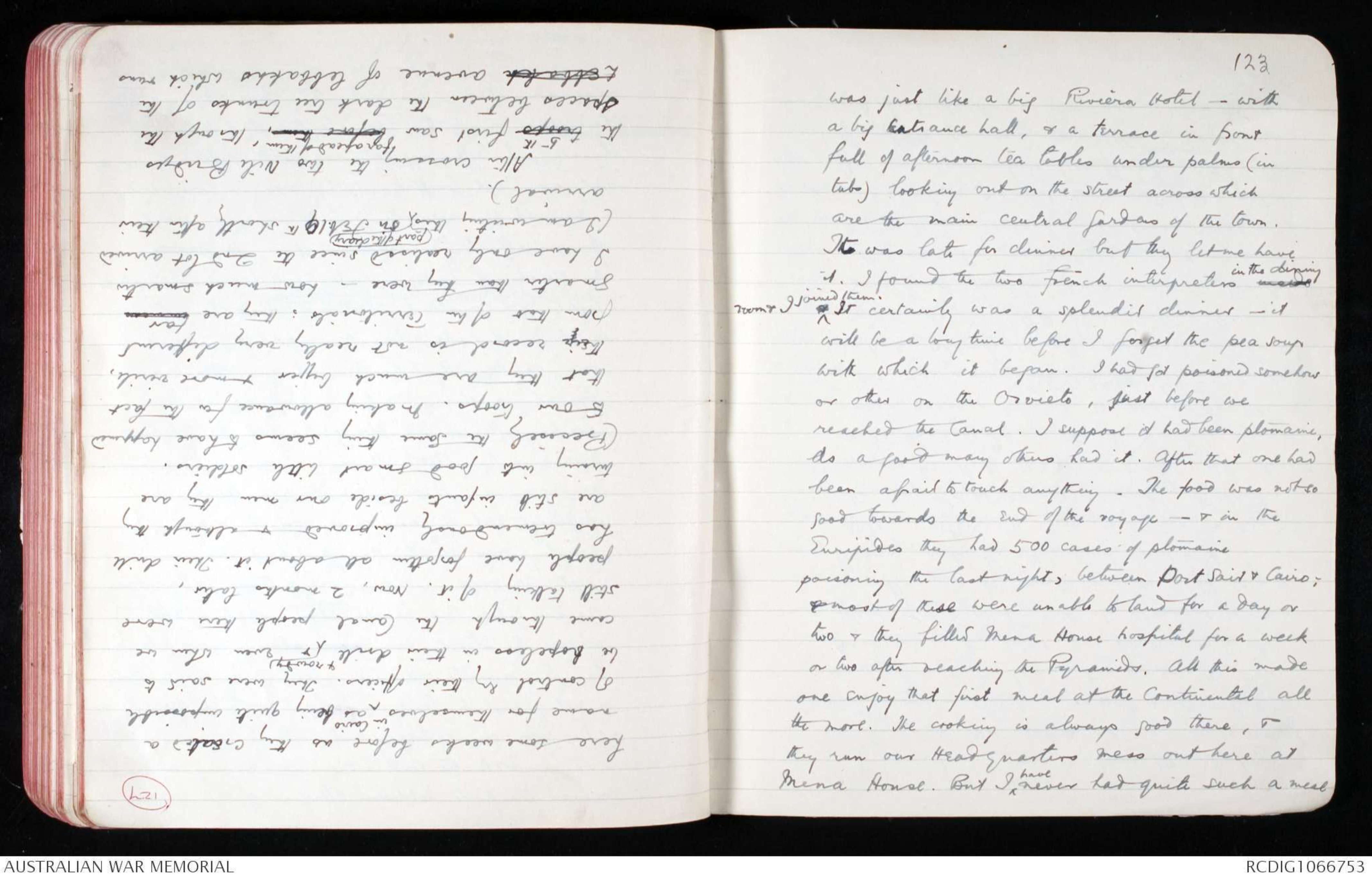
136
cables & get lunch. Massey - Renwick
never came back at all; but Schuler &
I did & were just in time to be
admitted with about a dozen foreign
journalists,. The Sultan looked very worn out,
& no wonder. But he made a very good
speech to us in French - he sitting in
the middle of a long row of chairs along
the side of the audience chamber & we
sitting on either hand.
Two of our battalions - Jacks
& one from the 2nd Brigade, the 7th if I
remember right, helped to line the route
at his function. It was that day, I
think, that I first met a certain N.Z.
officer who had been asked by Miss
Sprent, a friend of his wife's and an
authoress whom I met in Sydney at
Miss Jay's, to look out for me. He
I have seen him several times since & I
never meet him but he tries to rub into
me the excessive superiority of the N. Zealanders.
He told me how their transports were praised.
December. 1 & 2. 114.
as we passed - "Heep-Heep-Heep Hurrah."
The long Heep - heep - heep between each
cheer amused our men, but they were pleased
by it. all the same. We did not realise that the
French nation knew how to cheer at all. Our Some of our
chaps shouted Vive la France & the band played
the Marseillaise several times during the day
(we were anchored not a little beyond them) &
they always rose to the occasion, & showed greatexcelenc the stir among them was always
visible. They never tired of watching our
men drilling on deck.
Wed. December 2. After midday today our
transports began to reach Port Said in numbers,
You cd see them, one after the other, coming far along the
canal at intervals of about half
a mile. The until those at the back
were lost in the mirage. Seeing thatAs they passed us closer than ever
before - there was just enough room
for them to scrape through between us &
the French warships - there was something
of a demonstration as they went by -
135
days before the festivity - on Friday Dec 18 -
we journeyed round, with Mr Wild of the
Continental Hotel, in a cab to Stein's, the
big shop here, to see if we could hire some
clothes - that is, Massey, Renwick & we
two did. Stein wouldn't hire, so we drove
off to Chemla's & were all ^four measured for wholethe clothes suits except Renwick who managed
to borrow ^part of his from Mr Wild. We resolutely
refused to get frock coats as they wd be
no use at all in England; so the censor
compromised with us ^and agreed that Morning coats wd
do. The result was magnificent. We
all wore top hats except Jeffries, who
had borrowed one which was too small;
so he held it in his hand all the time
& stood reverently bare headed. I had
forgotten my gloves. So Massey kindly
shared his pair with me - he carried one
& I carried the other.In the We saw the whole ceremony; -
but the wait for the audience was so
long that we had to go off to send our
December 2. 115.
cheering & counter-cheering in gusts in a
way ^in which I have very seldom heard Australians
cheer before. Australian crowds are to
self-conscious for this form of demonstration
unless they are very much absorbed in
what they are watching - for example, a
big football match, or a prize-fight. The
other transports (^I think those of the "fast" division) passed
between us & the French warships & thencontinued the lane a moored ahead of us
so as to continue the length of the
narrow lane which we made. As usual
the Euripides looked about the best of the
lot. As soon as they were through the
N. Zealanders moved out between them &we in the Orvieto followed. There wereone continuous an incessant of gusts
of cheering until the last ship was
passed - the only real demonstration
we ^have had on this trip. The we went ahead - the The Orvieto soon
Outside, the eight of us that had left Port Said,went ahead in ourselves & 7 N.Z. ships, went
ahead in any sort of order. We The
134
Oxfordshire yeomanry. I think; territorial
artillery ^- that of the division .)From The day of our arrival at
Port Said we heard rumours that a changeof was shortly to take place in the status
of Egypt. As soon as we reached Cairo we
found everyone, the Editors of the local
papers, & the English & foreign residents,
taking it for granted. The actual date
was a secret. But it eventually took
place almost immediately after we had
settled down to work - on December 18.
I have written up these changes very fully
in articles to the papers & I dont want to
repeat them here. The censor got
Schuler & myself included amongst
those who were to be received by the
Sultan at his palace on the occasion
of his accession. This involved getting a
whole rig out of civilian clothes - top
hat, morning coats & trousers.
Massey of the "Daily Telegraph", and
Renwick of the "Daily Chronicle" &
Jeffries of the "Daily Mail" were with us. Two
December. 2 & 3 116.
Orvieto soon passed them all.
Thurs. Dec. 3rd. Early this morning we were off
Alexandria & entered about breakfast
time. There were about 20 German & Austrian
steamers in the harbour, & about as
many sailing ships, ^nearly all taken when
they were forced to leave the Suez Canal
where they were sheltering. They The steamers were mostly
cargo boats, but there were a few fair
sized intermediate liners amongst them.
The Alexandria Prize Court has been
deciding ever since whether they were
prizes or no.
We came about halfway up the
harbour & pulled into berth 56 or thereabouts.
There were a few natives on the Quay; & heresome it was we first had an object lesson
of the way in which ^native policemen in this
country deal with crowds. Some
seller of newspapers or drinks managed
to get through the line of sentries &
disobeyed the policeman to an extent whichthey he considered above the limit - so he went
133
tents from everywhere - from arab merchants,
from Egyptian army sources, some had evidently
come from India; some came from England.
But by the end of a fortnight for the first
time we had the different parts of our force had gradually shaken themselves
loose. The Light Horse Brigade was in its
own camp at Maadi; the 1st Australian
Division was at in its own camp at
Mena under the Pyramids; & the
New Zealanders were in camp about
5 miles N.E. of Cairo at Heliopolis & Zeitoun,
near Heliopolis & Abbassia where most
of the British territorials were congregated.
The Indian troops on the canal & these
English troop territorials here (infantry, a
Lancashire division largely made up of
boys from the cotton mills - small little chaps
but all the more credit to them; cavalry
- the Westminster dragoons, a rather select
class of young Englishmen with a splendid
band which plays at Shepheards; the
Hertfordshire yeomanry, in which I believe
Grover, an old Brentwood, is serving; & the
December 3. 117.
for him like a tiger. He had a short horsewhip
of cane or hide in his hand; & he fairly
lathered the man with it. Hit him over
the head, arms, body, kicked him, pushed
him, hit him until one would have
thought he would really be badly hurt.
The men in the Orvieto, who were all
watching like a crowded gallery, couldn't
understand this sort of thing at all.
The called out to the policeman to stop,
& really their temper began to be worked
up to a pretty high pitch. (They have
come to take these things more calmly
since. These same hawkers & pests
in the streets have worked upon themso taken them down so consistently
& pestered them so much that they don't
look at things quite the same way.
Whether it is really a good thing ornot - or whether it does not incline
men insensibly towards bullying, I
don't know. It seems almost the
only way of dealing with the rabble
here. They have no restraint & no
132
scattered that you scarcely noticed them
on the hill.
For a fortnight our troops were
gradually pouring into this camp & the
smaller camp 10 miles ^away across the
river at Maadi. The disembarkation
seemed likely to take a month at first,
because instead of giving us 10 trains
a day, as promised, they only gave us
3 or 4. But the territorial officer who
managed the whole thing stuck to it
day & night & really did it very well.
In those early days there was a small
territorial detachment camped at the entrance
to our camp, who helped to received all detailsof our supplies. Gradually huge stacks of
provisions built themselves up around the
little desert grandstand on the "beach"".
The tramway was very shortly finished with
a siding backing right into the heart of these
stacks. The grandstand itself & its enclosure
became an ordnance store. We had to scrape
December 3. 118.
morality of our sort; & although they have
considerable virtues of their own you are apt
to get disaster when people with their morality
meet with people of our morality unless the two are
kept apart by a hard cut divis & fast division. The two moralitiesdon overlap as it were; & at the point they are slack in some things
where we are strict. And our people coming into
contact with that slackness are apt to go all to
the dogs unless the distance between the two
is maintained. It is interesting to see how, after
a little stay here, that distance creates itself.
Our men were cheek by jowl with the natives
when they landed - as any good ^democratic Australians would
be. I was inclined to be so myself. Within a
month or two the trouble, if any, is that
we are inclined to be intolerant of them.
I heard an officer yesterday talking about
"vile spawn spewed out of the ground" or something
equally Shakespearean. That seems a bit
strong for any Australian talking about his
fellow mortals. But I think this particular
officer was a bit exceptional.
We disembarked about 3 in the
afternoon into a train which was standing almost
131
were waiting for it, marched down the
road onto the sand & camped bivouacked on the
side of the valley rolled up in their
grey blankets ^under the moon just as they were. There
was nothing in the valley but sand inunbroken a stretch of sand, unbroken
by anything except a ^white ribbon of road
faced with limestone & rolled flat by six steam
rollers; the scaffolding around two
large unfinished cisterns or reservoirs
^on the hillsides, one on either side of the valley; &
a length of piping being fitted for the
water service of the camp & not so far
covered with sand. Looking on the huge wide
permanent camp, with its mess rooms,
shops, bookstalls, rows and rows of tents,
kitchens, waggons & guns all parked &
roads neatly bordered with white stones
taken from the ^dumps of the excavations above the
camp it is hard to believe that two
months ago it was open desert -
tenanted only by the grandstand of the
desert racecourse on the flat & one
or two solitary buildings so widely
119
alongside of us. One of Half of the 5th Infantry with
its band, & the 2nd Coy of Engineers came up
with us. We had a ^days ration of biscuits & bully
beef; the biscuits were Australian & they were
quite good. With a little chocolate they made
an excellent meal.
The country we went through out
of Cairo was full of sights that were like as strange
as a picture show to Australians. Low pastures
cut up into little squares by low drymud irrigation furrows - all as minute
as a chinaman's garden. After Occasional
high grey mud dykes wandering across
the country like long ^black dusty snakes; &als stalking along the top of them, often
silhouetted against the sky, like the figures on
the frieze of a wall paper, a procession ^constant stream of
people that might have stepped out of the
bible; ^tall peasants whose d dress seemed to consist
of a towel wrapped round their head & a ^long blue
cotton night gown; big fat proprietors with
richx, ^coloured cloaks over their white undershirts,
riding ^solemnly on white asses; women, as straight
as those that ^sometimes bear up the roof ^beams of a Greek temple,
130
where they sold very inferior coffee & I
believe bear alcohol no better until the general
staff gave them a twist. And above the
plantation, on the right of the road &
running back from it for at least 100
yards in blocks evidently wh looked as if they had bn tacked on one
after the other to the main building
as need arose for them, ws the big
Mena House Hotel, taken over
rented by us as a hospital.From the through the plantation
From the ^main road, at right angles to
the right, down on an embankment
through the plantation & thence onto
what I call the "beach" & finally
the authorities had built a road -
It wound round the foot of one
of the desert fingers & then to the
left up the desert valley between
that finger & the next. On This was the
road into camp. That night the 5th Infantry
after waiting to load its baggage from trams
which had brought it onto native carts which
120
draped in one flowing dress of black with earthenware
pitchers on their heads, & hiding half their face
with their hood as we passed - when they had not
a yashmak. small boys squatted on ^dusty black buffaloes
which looked as though their home were the
mud & they were sorry they ever left it; camels
loaded on either side with such huge parcels of
berseen (native lucerne) or maize, or sugar cane,
that it looked as though a hay small haystack
had somehow got on the move come to life, & had managed
to get a camels head & tail attached to it;
small weedy duncoloured native cattle;
occasionally an arab horse, with very poor,
but with a prettily arched tail & neck
which even in poor when their ribs are
sticking out gives them a certain beauty when
first you see them. Every now &
then we passed what you would taketo be an old dry grey dustheap with
few rags fluttering about it, ^which, if you
did not see that various humps in
the heap contained windows & that
there seemed to be a maze of passages
through it, you would take to be the dump
129
the top of one of these fingers are the Pyramids,
two very large ones, a smaller one, & three not soscarcely very much bigger than some of the huge tombs in
the soo ancient cemetery which was laid out
on top of this limestone ridge at the same time,
& which is being excavated by an expeditionsupported by Harvard University under Dr Reissner,
an American Egyptologist, supported by Harvard
University - Harvard he gets half the finds & the Egyptian
Museum the other half.
Just where the road runs off the flats
onto the slope up to the desert, on the right of
the road & below the level of the causeway,
is a plantation of gums & wattles -
just on or about two acres of Murray Flats transported
here into the first country we come to. It didn't
seem so strange to the men as to me, because
they have never been yet in a country
where gumtrees didn't grow & so had never
learned to miss them in the scenery.
On the opposite side of the road to this
plantation was the terminus of the Tramway,
and a cafe - a rather flimsy terrace erection
121.
about some mine, or the dry mud thrown
up alongside a dam. These were native
villages - & even after 2 months in this
country it is still a tat mystery to one whats
what sort of existence these people manage
to support there.
It was dark before we reached Cairo.
We passed through the main station & on
to a pl long platform which, though one
did not realise it at the time, was
really inside the precincts of the Kasr
-on-Nil barracks. The earth gravel of
the platform was new & it had clearly
been thrown up within the last few
days. As a matter of fact it was
made specially for us. We got
out & watched the baggage rescued from
the train. There was a stall on the
station & some people were serving
hot coffee there. The men of the various
companies were allowed to break off
& have a cup - it was well managed. I
stood by the baggage until all mine & Capt
de Bucy's (he came along with me) had been
128
the whole 5 miles of the road, the distant shapes
of the Pyramids, It was a moonlight night
- with a very bright moon. For the best part
of two hours they marched towards
those Pyramids & finally reached the
point where the road runs off the ^dark green Nile
flats onto the edge of the desert, The
Nile flood ws just receding & this edge
of the flats was one big lake lapping
up against the Arab village which
lies under the Pyramids. The desert rose
before them, straight from the plain,
a faint gl pink under the moon. It
is limestone, windworn into all sorts
of angular valleys & crevices half
filled with drift sand as ^the ruts of an English
lane will fill with snow. Whatever is
above the level of the Nile flood is
desert - for no rain falls here or next
to none. And on The edge of this desert, thefingers of which rises 100 to 200 feet high, withan a sort of sandy beach like a web between[*that*] & around the high fingers binding in bordering theedge flats as if it were a sea coast; & on
122
rescued. Then, as all the ^5th had marched off & all the other officers
had gone on to the Grand Continental Hotel for
dinner, I left my batman with orders to
act as Capt. Griffiths (who was in command
& had sd he wd return) told him, & went
off myself to the Continental. It was a
The streets of Cairo, with their dazzling electric
lights , ^big white shopfronts, gardens of palms & constant clatter of cabs clang of trams
& clatter of cabs along the asphalt, struck
one as exactly like those of any other big
French or Italian city - afterwards, six
weeks afterwards Mr Makarius, the editor &
owner of the Mokattam, a very influential
newspaper, drove me through quite a
different sort of Cairo - a sort of maze of
winding nar streets through which you can
just squeeze a cab, one of those extraordinary
Eastern cities that has no plan system whatever, sod
where the streets run more plan more planless
than the minute veins in a leaf, a maze which
is not meant to lead anywhere & which surely no
native even can entirely understand.
Well the Continental was giving
a special tariff to Soldiers Officers of 10/- a day. It
127
here some weeks before as they created a
name for themselves ^in Cairo as being quite impossible
of control by their officers. They were said to
be hopeless in their drill ^& rowdy & even when we
came through the Canal people there were
still talking of it. Now, 2 months later,
people have forgotten all about it, Their drill
has tremendously improved & although they
are still infants besides our men they are
turning into good smart little soldiers.
(Precisely the same thing seems to have happened
to our troops. Making allowance for the fact
that they are much bigger & more virile,
their record is not really very different
from that of the Territorials, they are far awareness
smarter than they were - how much smarter
I have only realised since the 2nd lot arrived
(I am writing this ^part of the diary on Feb. 19th shortly after their
arrival).
After crossing the two Nile Bridges
the troops 5th first saw before them far ahead of them, through the
spaces between the dark tree trunks of theLebbakhs avenue of lebbakhs which runs
123
was just like a big Riviera Hotel - with
a big Entrance hall, & a terrace in front
full of afternoon tea tables under palms (in
tubs) looking out on the street across which
are the main central gardens of the town.
Ite was late for dinner but they let me have
it. I found the two French interpreters in the dining mess
^room & I joined them. It certainly was a splendid dinner - it
will be a long time before I forget the pea soup
with which it began. I had got poisoned somehow
or other on the Orvieto, just before we
reached the Canal. I suppose it had been ptomaine,
as a good many others had it. After that one had
been afraid to touch anything. The food was not so
good towards the end of the voyage - & in the
Euripides they had 500 cases of ptomaine
poisoning the last night, between Port Said & Cairo;
& most of these were unable to land for a day or
two & they filled Mena House hospital for a week
or two after reaching the Pyramids. All this made
one enjoy that first meal at the Continental all
the more. The cooking is always good there, &
they run our Headquarters mess out here at
Mena House. But I ^have never had quite such a meal
 Diane Ware
Diane WareThis transcription item is now locked to you for editing. To release the lock either Save your changes or Cancel.
This lock will be automatically released after 60 minutes of inactivity.